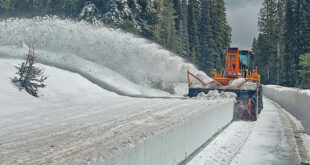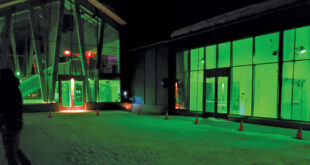Only for animals abandoned or lost
With his head resting on a paw, tail sweeping the floor behind him, it’s hard to believe Pete, an 18-month old border collie mix with a gentle demeanor and sharp eyes, almost didn’t make it. He and seven other dogs like him were about to take one last walk with their previous owner when they were rescued and brought to paradise.
With Pete close by, Paradise Animal Welfare Society (PAWS) president Rita Clement says, “Last week [a volunteer] got a call from someone she knew in Crawford and was told that the woman that owned these dogs was going to shoot five puppies, this guy, his brother and another one.”
The all-volunteer team from PAWS wouldn’t hear of it and joined with dog rescues in Eagle and Summit counties to take the lot. Pete and his brother, along with two young puppies, were brought to the outskirts of Crested Butte, to the newly opened PAWS rescue facility on Hwy. 135.
They are just a few of the hundreds of lost or abandoned dogs and cats that have found refuge with PAWS since the non-profit animal rescue got its start in 2005. And the mission today is the same as it was back then: to hold animals briefly before finding each a permanent home.
“It’s a rescue facility,” Rita says. “It’s not the kind of place where someone can bring an animal they don’t want anymore, except for these dogs [Pete and kin]… this was a true rescue.” Under regular circumstances, only the police or a concerned citizen can bring an animal to PAWS. You won’t find a volunteer on the street with a catch pole.
And having the facility makes that job a lot easier, and takes the pressure off the group’s 15 volunteers to foster animals at home when they come in. “We’ve tended to keep them,” Rita says of the animals that come in as foster pets. Over the last several years, the Clements have accumulated seven dogs; volunteer Sharon Sharpe has four.
The $300,000 PAWS building, which opened in February, is the vision that a core group of PAWS volunteers had when they started laying plans for the facility two years ago. It holds seven kennels, each with a 10-foot fully enclosed run that will be attached this summer and an entire room for cats.
At times when the kennels have been full, especially with puppies, volunteers staff the building for as many as 15 hours a day, taking walks and playing with the dogs. And the newly arrived puppies still go home with a volunteer every night.
But with the facility up and running—complete with donated couches and cupboards, a laundry room and bathroom—and often occupied by a volunteer, the animals are always in a home environment with a family level of care.
PAWS makes sure any animal that is at the facility for an extended period of time gets the vaccinations necessary to protect other animals at the facility from things like rabies. Before a dog or cat can be adopted, it is spayed or neutered and has a microchip implanted under the skin so the animal can more easily be reunited with an owner if it’s lost again.
Vaccinations and a microchip, or at the very least a tag with an owner’s contact information, are some of the things the volunteers of PAWS would like to see more of in dogs or cats coming through the door.
“Dogs and cats really need to be tagged. From this side looking out, that’s really our biggest gripe,” Rita says. “People immediately think that as soon as they lose their cat it gets taken by wildlife, and many times it’s not.”
Dave Clement says it’s obvious that the residents and visitors to the Gunnison Valley care for their pets, but they sometimes fail to take the most basic steps to protect them. “They obviously care a lot, because they’ll call KBUT or the marshal. But if people would just put a tag and a phone number on their dog, it would help,” he says.
Rita adds, “The other thing people don’t realize is that if we have an animal come to us that isn’t claimed right away, especially cats, we have to bring the animal to Dr. Laura Ramos to be checked over and it has to get shots because we don’t know where it’s coming from.”
Those visits add to the cost of running the facility, which is a part of the process that the volunteers are constantly learning about. “It’s a learning thing,” Rita says. “Now that we’re open, we’re in the process of learning. A lot of the things that have come to us are things we’ve never really thought about. Now we’re thinking about them. It’s different.”
For now, PAWS has settled on a fee of $15 a day for animals that stay while unclaimed at the shelter. And while those are real costs of doing business, not everyone who comes to claim an animal is happy about the charges. But the cost is as much about making the operation run as it is to cover the costs of feeding and housing an individual animal.
Along with the medical care rescued dogs and cats get from PAWS, the group also offers financial assistance to people who can’t afford to have their animals treated by a veterinarian. In the last six years, the group has helped get medical care for more than 100 animals.
While PAWS has a steady group of donors, it still comes down to a concern about money.
Sharpe says, “We haven’t applied for local money in a while but we have in the past. There are many non-profit organizations in the valley and we do get a lot of donations, so we don’t like to hit people up for money.”
But with the facility now open, the PAWS board sees a chance to show the community what has come of their donations and hopes to start actively fundraising again soon.
“From what I understand, a shelter never breaks even,” Rita says. “You might make enough money to keep it running and that’s all we need.
To donate time or money to PAWS, or to inquire about a lost pet, call 209-3656. They always answer the phone.
 The Crested Butte News Serving the Gunnison Valley since 1999
The Crested Butte News Serving the Gunnison Valley since 1999



